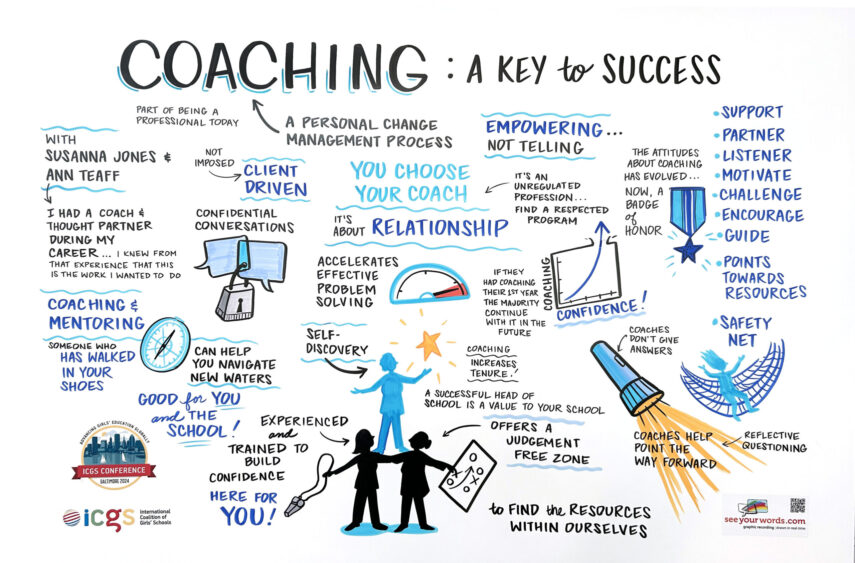The Hidden Advantage: 5 Reasons to Invest in Executive Coaching

Summer in school means many things including the beginnings of new contracts and with them, often, new responsibilities. You might have just started a new job – possibly at a new school or at your old school. At the very least, you are looking towards a new school year and are thinking about your goals for 25-26. You may be anticipating the excitement of new opportunities or considering how to manage the challenges you know you will face – or both. And you know that, in all likelihood, you will encounter unexpected challenges.
Being a school administrator is tremendously rewarding as you shape the institution where you work, influencing, sometimes in small ways, sometimes in profound ways, the experience of your students and the adults with whom you work. It can also be very hard, testing your courage and fortitude and causing you to question your chosen vocation. And it can be lonely, especially if you are a Head of School. Having a coach can help you find greater reward in the positive aspects of the job and navigate the challenging aspects with more confidence.
If you haven’t worked with a coach in the past, imagine having a confidential non-judgmental thought partner who is there whenever needed to help you think through how to manage issues large or small, strategic or operational, singular or more typical. Consider what a gift it is to have someone with years of school administrative experience to help you solve problems or just listen, someone who has an objective view of you and your school. As one first-year division director observed,
Having a consistent space where I can be vulnerable, discuss the various personalities and types of leadership that are present in school communities and on an admin team, share my instinct and thought process, address my fears and weaknesses, and lean into my strengths with someone who has experience both as a division director and a head of school has been invaluable to me and to my school community.
A Dependable Guide
It is not necessarily the coach’s role to give advice. While there are circumstances when the coachee really wants advice when it’s appropriate to offer it, in general, a coach guides a person to find their own solutions. They usually have the knowledge and resources themselves; they just need focusing to access them and confidence to apply them. My coach’s “wise and honest counsel has been an invaluable mirror to propel reflection, action, and confident leadership. Through years of experience, she guides and advises but mostly helps to draw out my own perceptions and insights,” explained a Head of School. Clients consistently cite building confidence as a primary impact of coaching. Praise for her coach’s ability to help her “develop confidence in my own decisions” is typical of how Heads assess the value of coaching.
Assistance Navigating Board Relationships
For Heads of School, the relationship with your Board Chair and the Board generally is key to your success and yet, as one new Head commented, “working with a Board was a whole new game.” This critically important part of the job is one with which new Heads have no direct experience. Because of this, the Board Chair/Head relationship stands out as a place where a coach can provide particularly valuable support – for both new and experienced heads.
Focus on Strategic Goals
School administrators all have strategic long-term goals and at the same time, issues constantly arise that demand our attention. You are, of course, judged by how well you manage the myriad problems that cross your desk. However, the ultimate measure of your success lies in how you move the institution forward. Doing that requires focus on those longer-term goals and attending to your daily demands can easily distract you from pursuing your strategic objectives. This is another place where a coach can help by reminding you of your strategic objectives and pushing you to find ways to prioritize the work that is important but not necessarily urgent.
In-Demand Resource
Finally, hopefully we all have our networks of trusted friends and colleagues. However, those people probably also have busy jobs and numerous responsibilities. Generous though they may be with their time, they may have limited availability or we may hesitate to impose. Or a situation may be confidential and not one that you can share, even with a trusted friend or mentor. A coach is always there for you. They are your dedicated partner with whom you never have to hesitate to reach out. It’s your resource for you to use as needed. That is another gift.
A Supportive Partner
Carney Sandoe surveys Heads of School new to their positions every June about the experience of their first year in the job. Among other questions, we ask about what was most helpful. Heads repeatedly identify coaching as one of the most helpful elements that the school provided (only regular meetings and support from the Board Chair came up more). On the flipside, many respondents who did not have coaches would have appreciated that type of support. As one Head said, “I had a retired, experienced school head as a coach. That was incredibly helpful.”
At Carney Sandoe, we have an entire practice dedicated to coaching. The practice consists of former Heads of School as well as other seasoned senior administrators. Our top goal is always to help schools and we know that coaching can make a real difference in the life and success of a school administrator. If you don’t have a coach lined up for next year, we encourage you to think about what a valuable investment that would be for both you and your school. We’d love to talk to you about what a coaching engagement would look like!
Please contact Bob Vitalo if you are interested in Leadership Coaching at robert.vitalo@carneysandoe.com








